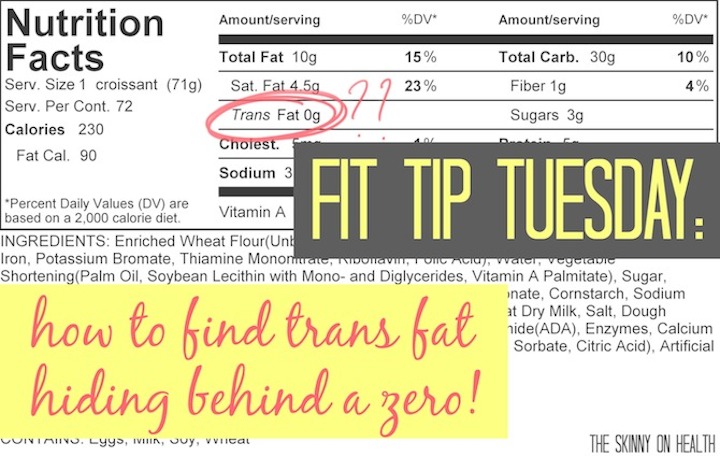Trans fats, and all fats actually, are difficult to understand. Most people really don’t know why trans are worse for you than other fats, they pretty must just get the gist of fats: trans fats= bad, omega-3s = good! Right? Why is coconut oil better for you than other oils? Is it? What about the butter or margarine debate? Olive oil? Fish? As you can clearly see, I could write about fat for days. So I figure, why not start at the belly of the fat beast: trans.
I could bore you guys with a biochemistry lesson (do any of you want to learn about the molecular structure of trans fats and why that makes them worse for you than other fats?), but instead, I’ll just explain what is important in your day-to-day life.
Doctors recommend you get less than 2 grams of trans fat per day. Easy enough if you avoid foods without trans fat. Wrong.
The FDA only requires that foods be labeled as having trans fat if there is greater than 0.5 grams in one serving. So, all of those foods with nutrition labels claiming “0 grams trans fat” could have as much as 0.5 grams of it in a serving! A half a gram may seem tiny and harmless, but trust me, 0.5 grams trans fat is a TOO MUCH of it. If you think about it, that makes it pretty easy to rack up over 2 grams per day of the stuff!
How do you avoid eating these secret trans fat foods? Read the ingredients, don’t trust the grams on the label. If the word “hydrogenated” is anywhere on the ingredient list, do not eat it!! And yes, “partially hydrogenated” still is hydrogenated, put it down!
So, to sum up, the label could be hiding an amount of trans fat that the FDA doesn’t require labeling. If the word “hydrogenated” or “partially hydrogenated” is anywhere on the ingred list, it contains up to 0.5 grams trans fat.
Bet you wanna punch the guy who invented hydrogenated oils in the face, huh? What kind of cold, cruel person would invent a process that makes fat even worse for you?! Fun fact: hydrogenated fat was not intended to be eaten when invented! It was in the mid 19th century, and street lamps were lit with oil from whale fat. By hydrogenating the oil, they could make it last longer without getting rancid and could have more control over the texture (making it more solid at average temperatures).
To be extra cautious, stick to fats that are liquid at room temperature (like oil!).
Do you guys have any fat questions? Curious about coconut oil? Would you want me to write about the more scientific side of trans fats?
Follow me on Bloglovin!



















Pingback: Let’s Talk Coconut Oil | The Skinny on Health
Pingback: FIT TIP TUES LINK UP: DETAILS, RULES, & WHAT TO DO! | The Skinny on Health